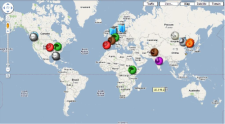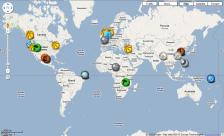James Bloomer
While James Bloomer is a staunch supporter for optimistic science fiction, he also does not shy away from telling when a DayBreak story didn’t work for him, sometimes remarking that the ‘feel-good’ factor was tuned too low for his liking (or even missing). Make no mistake: I welcome comments and critiques, both positive and negative.
Nevertheless, I think every magazine needs variety: also one dedicated to upbeat SF. So sometimes progress will be a small step, incredibly hardfought. Sometimes progress in one area comes together with decline in another. Sometimes the road ahead is harder than we expected, but sometimes it’s easier than we feared. And sometimes, yes, there will be unmitigated Utopia.
To paraphrase a world famous poem:
Idyllic Utopia, shining bright
In SF’s dystopian night
What immoral hand or eye
Dare propose thy fearless lullaby?
Kidding aside, even James Bloomer’s “The Rules of Utopia” does not come without its price. But yeah, does it shine bright, eventually…
1. No One Is Lonely
The evening sun was still high and golden, yet the light had a thicker consistency than earlier on in the day. The pub had a large front garden, dotted with wooden picnic tables, some with umbrellas, some without. People were everywhere: old, young, parents, single, kids, dogs. Local. Meaning from within the area. It wasn’t a special holiday or a weekend, it was just a sunny evening with blue sky and warm air, and like every other day you could always find someone to talk to. No one was lonely.
And on other nights there was not just people to meet but things to do: make, do, learn, volunteer. Providing people joy and purpose. There was a church for those who believed, a shop to post notices in the window and a cricket pitch around which to gather on match days.
Lucas stood on the edge of the social fray, alone and intimidated, feeling lonely and a little scared. He had moved into one of the old terraced cottages on main street a week ago, after returning from three years working in Switzerland. After his life had collapsed around him.
His stomach swirled and a great wash of hopelessness crashed over him. He turned.
“Hello.”
A voice, clear and direct, at him.
He turned back to see a man, his age, smiling, a touch of concern in his eyes.
“New to the village?”
“Yes,” said Lucas.
And that was how the conversation started. Throughout the evening Lucas met more people. Not all of them became his friends. He didn’t feel better immediately. But slowly, eventually, and seemingly from out of nowhere, a social life grew, and Lucas was no longer lonely.
2. No One Has To Work
When capitalism finally died, not in a catastrophic collapse, but in a slow diseased death, coughing and spluttering, Lucas wondered for a moment how he would survive. No job. No money.
There was surprisingly little panic, from both Lucas and the country at large. Instead there was relief, that finally they could move on and find something better.
The village held a meeting in the cricket pavilion, the adults sat on plastic chairs set in concentric circles, the kids played outside in the sunshine. The village came up with a plan: it started with meagre eco transformations of houses, moved through shared food production including the farms that lay around the village, attacked the water problem by resurrecting the old well and searching for new water tables, and ended up with a new recycling centre.
No one was really sure whether it would work, or where they would get some of the materials from, but the confederation of small ex-companies that lived on the trading estate within the village were confident that they could manufacture anything. Someone even owned a three dimensional printer. Fabrication was targeted as an area which could prove useful for time investment.
Lucas volunteered to join the electricity team whose remit was to make the village self-sufficient and sustainable. They began to manufacture solar panels and wind tape turbines. It was hard work, often with seemingly insurmountable problems. But Lucas enjoyed it and worked hard.
After five years the plan came to fruition, the village infrastructure became self-sufficient and the work teams moved to a low key maintenance schedule. Which meant that everyone could once again spend their copious free time doing whatever they fancied.
3. No One Is Hungry
In the first blushes of independence the village’s food production seemed the least of their problems. Everyone grew vegetables and fruit in their own gardens, the village wiki being used to organise who grew what, when, and how to share it. The surrounding farms grew wheat and raised cattle. Some villagers kept goats and pigs in their gardens too.
Lucas specialised in fruit trees; successfully cultivating cherry trees, pear trees and apple trees, although the cherry trees were somewhat erratic in their production of fruit. In fact all of the village food production was somewhat erratic, and for the first few years it didn’t matter.
When the stockpiles of food available from outside the village ran out, suddenly the villages self-sufficiency with regards to food was starkly highlighted. No more bartering, no more scavenging, just the food they grew themselves. The population of the village was upbeat about the situation, but Lucas felt a small kernel of dread roll around inside him.
The dread was an awful foreshadowing of the disaster: crop failure in a massive way. Wheat wiped out by rain. Fruit diseased. Vegetables eaten by bugs. They all knew, come the autumn harvest, that winter was going to be hard, but Lucas never imagined it could be so terrible. No bread. No fruit. No vegetables. The meat went so far, but eventually there was nothing for the animals to eat. Through the bleak winter and spring months, Lucas had never been so hungry. The ache of slow starvation became a terrible constant companion.
A rescue package arrived in early spring, tins from the open communities factory project; factories built by volunteers, automated, constructed to open source specifications. But even the factories needed raw materials and everywhere was struggling. Lucas enjoyed a week of tomato soup and processed ham, but knew that it wouldn’t last.
Instead of hoping that someone else would solve the problems, he joined the gene modification programmes which were trying to tweak the food to be more resilient. In particular Lucas joined the super-wheat programme, intent on producing a multiple-harvest, super durable wheat crop.
It only took two months to solve the super-wheat problem once the project had been fully committed to; the result an easy to cultivate, fast growing, incredibly hardy wheat. Whilst others moved on to bolster other crops, Lucas instead joined a small team within the village working on micro-mill bread ovens. Within six months everyone grew their own wheat and made their own bread, none of the modified crops ever failed, and no one was ever hungry again.
The village thought it had avoided the flu pandemic, but somehow through some spurious contact with the outside world it sneaked in. As soon as it was realised that the population was infected, the village implemented a strict quarantine system.
Lucas joined the drug micro-factory team, which fabricated a machine within a couple of long days from open source specifications gathered from the net. There was no panic, but quietly he realised that they may be fighting for their survival. Another few days and they had succeeded in manufacturing enough anti-viral drugs for everybody.
Too late for Helen Smith though, who’s other health complications teamed up with the virus to end her life. She was only thirty-six. The village wanted a funeral, but resisted the urge, lest they spread the virus even more. Lucas cried the night she died, cried for the first time in years.
With the anti-viral drugs apparantly not working, every spare person in the village threw themselves into the global research programme to combat the virus. The programme had been opened up and segmented such that everyone could contribute; be it adding another node to their distributed computing grid, visually verifying data, solving complex biological conundrums, or driving robots in a far away sequencing lab.
Three more people died in the village before they found a vaccine. Lucas had begun to think that it was the apocalypse, the hard work and social isolation taking its toll. But the vaccine was an easily manufactured gene therapy, one that they produced within a day of finding the solution.
To begin with the population in the village grew organically and Lucas hardly noticed the difference, just a few more kids here and there, a slightly larger crowd at the pub, more chairs needed at the village meetings. But after a few years the immigration increased and the trouble began.
A family from Russia claimed a dormant field and began to build a crude old fashioned home. Lucas watched in dismay as they toiled by hand to slap in old bricks and tiles. The village met to discuss the issue, unused to violations of the communal will. The debate was heated. Lucas felt sick and scared. His beloved village, ruined by foreigners, by immigrants. Anger surged through him and the others. They let the anger burn, said horrible things, until they were spent and dull with fear.
Someone, with a clearer head, asked how many people had lived in the village all of their life. Only the youngsters put their hands up, everyone else had moved in, sometime. Like Lucas. And was welcomed. The realisation boldened him to speak.
“Could we build more houses?” said Lucas.
Heads turned, eyes glared.
“If we build them then we can ensure that they are self sufficient and sustainable.”
“Where exactly would you build them?” said John, a young man, born in the village, athletic and intelligent, expression open and questioning.
“One of the fields?”
“And the crops?”
“Build flat or gently sloping roofs, and grow the crops on top. The super-wheat will grow anywhere and the harvest bots can work anywhere. In fact if we slope the roofs we gain more growing surface area.”
A moment of silence was overtaken by an outburst of simultaneous conversations.
They built the houses and it worked, temporarily. For a while everyone was welcome if they were willing to build a house to the required specification. If not they were asked to leave, and they did. Until there was nowhere else to go. Until the world was so full that living in a tent became the norm. One of the village fields turned into a refugee camp, a sub-village. The infrastructure struggled to provide food and water.
There seemed only one solution. Find somewhere else.
So backed into a corner the world finally did. Global space programmes commenced: new scram jet to orbital planes, a proper space station, terraforming Mars. All the arguments and objections dropped away when the realisation hit: there was no other choice.
Lucas worked on the new orbital craft programme and designed a plane that could be fabricated easily. Then a team from the village built one and offered it to anyone who wanted it. Unsurprisingly the tent population grabbed it with eager hands. They towed it to the old air-force base, shot into space and headed for Mars. Looking for land and a new life.
For a year the orbital planes tore over the village, bright metallic streaks, ripping through the atmosphere. Lucas would stand still and raise his head, watch them. Wonder at the lives they were heading for. Proud of his work. Sad that it came down to shipping people away. But no one was forced. Everyone left with hope and enthusiasm.
Lucas owned a dog, a black and white Cocker Spaniel. The dog had come from a litter of two, born in the village. When Lucas saw him he couldn’t resist; small, cute, cheeky. Lucas named him Ben. They went everywhere together. Ben and Lucas. Lucas and Ben. Throughout the village they were known as a pair.
Not that it prevented Lucas from looking for a romantic pairing. He dated a few women from the village, and also for one scandalous month, a woman from outside the village. But there were no sparks, no love beyond initial lust, and all of the relationships faded away amicably.
Lucas never felt lonely, because the village was such a social place, always with someone to talk to, work with, play with. He never really felt alone either, because Ben was always with him. He did however feel like a part of him was missing.
Ben lived until he was fifteen, only slowing down and losing his puppy-like enthusiasm in the last year. In the end he died of nothing more than old age; the gene therapy shots fighting off cancer twice. A full and happy dog’s life.
Ben’s death hit Lucas hard. He spent a lot of time alone and crying. The world looked grey and black. He got up early, climbed onto the peak of his roof astride the solar panels and watched the sun come up over his village, wondering what life was all about.
He tried to throw himself into some work, a project to distract him. He spent time on biological projects: life extension, illness cures, mental enhancers. Edging the human lifespan out slowly whilst maintaining quality of life. But closeness to the building blocks of life made him question life even more.
He searched elsewhere: religion, physics, sport. And found no answers.
One day he walked to the village green and lay prone in the middle of the cricket pitch, staring at the clouds which were pink in the rays of the setting sun. And he cried. Cried like it was the end of his world.
A black Labrador found him, licked his tears away. Lucas tried to ignore it.
“I’m sorry! Monty!” The voice was female.
The dog was pulled away and the woman knelt down beside him.
“Are you okay, Lucas?”
Her name was Maria, recently returned to the village after two decades of wanderlust. Lucas didn’t know her too well, he had talked to her a few times, years ago, when she was restless and eager to see the world.
“No,” said Lucas, “I’m not okay.”
“Oh, Lucas.” She pulled him up, forced him into her arms, then held him tight whilst he cried.
Lucas tried anti-depressant drugs for a week, then swapped them for a diet rich in Omega-3, a daily run and time with Maria. They worked together on the weather coercion project, spent evenings in the company of the village at the pub, played tennis and cricket and cards. Laughed and cried and finally fell in love.
A complete and consuming love that made Lucas feel whole. A love that no one else was the slightest bit surprised at.
When Lucas and Maria’s first child was born, Lucas didn’t immediately feel the wonder that had been promised. But it gave him a focus, to make the world even better for his child.
The second child completed his family: a boy and a girl, a wife and a dog, a village to live in.
Life did not always make sense to Lucas, but more often than not he was happy.
Picture Credits:
- Pub: via The Old World;
- Cricket Pavillion: via Panoramio;
- Wheat: via Digital Journal;
- Immunity Booster: via Pharmalogical Reviews;
- Liftoff: via Chamorro Bible;
- Black Labrador: via Sodahead;
- Idyllic Village 2: via Lansdowne Villa;
 James Bloomer has a PhD in particle physics (he worked at CERN) and has probably forgotten more physics than most people ever learn. He has been running the SF blog Big Dumb Object for 242 internet years and writing Science Fiction for more than a decade in the real world. You can find him on Twitter @bigdumbobject.
James Bloomer has a PhD in particle physics (he worked at CERN) and has probably forgotten more physics than most people ever learn. He has been running the SF blog Big Dumb Object for 242 internet years and writing Science Fiction for more than a decade in the real world. You can find him on Twitter @bigdumbobject.
An interactive Google map with locations of the story:

























Pingback: Awards Pimpage: DayBreak Stories | DayBreak Magazine